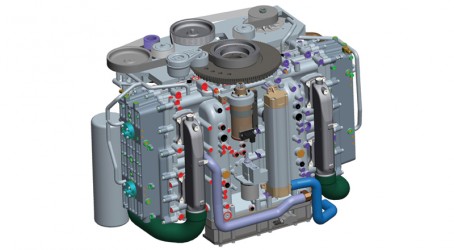Articles
The Ministry of Defence is funding the construction of an advanced-concept diesel engine intended for marine outboard applications on inflatable boats used by the Royal Navy.
The Cox Powertrain engine is based on a supercharged, two-stroke diesel, opposed-piston architecture with Scotch yoke crankshaft and a central injector position. This engine topology promises a power-to-weight ratio comparable to high-performance gasoline engines, while delivering diesel fuel consumption and a package volume around half that of a state-of-the-art diesel engine.
The engine is being developed for military applications in which extreme diesel performance, light weight and small package size are critical to mission performance, and must be delivered alongside robustness and high reliability of operation.
Cox Powertrain is working with Ricardo on the development of the engine, having relocated to premises at Ricardo’s Shoreham technical centre. The two firms have now completed the detailed design phase. This work has included computer-aided engineering to validate the design before prototype manufacture. Having concluded the design phase, the MoD has awarded a prototype development contract, with the first fire of the engine to be carried out later this month.
Charles Good, Cox Powertrain’s executive chairman, said: “We believe the opposed-piston engine has potential for military and civil applications requiring weight and package size as low as 50% of current conventional diesel engines, combined with extreme diesel power, while also addressing the changes demanded by the single-fuel policy.”
The opposed-piston engine concept has been the subject of fully subscribed private investment rounds raising development capital of £6.7 million, and has already attracted external funding from the MoD to support the accelerated development of its detailed design.

Armed forces push for single heavy fuel
The armed forces of Nato countries are increasingly mandating the use of a single heavy fuel across multiple defence applications, through initiatives such as the US Army’s One Fuel Forward policy, and the Royal Navy’s desire to reduce the use of gasoline engines at sea. This strategy is being followed to reduce the logistical challenges of supporting multiple fuels in theatre, and to avoid the safety risks associated with use of gasoline in hostile situations.
There is a need therefore to develop ultra-reliable, high power-to-weight ratio militarised diesel engines for applications ranging from marine outboards to unmanned aerial vehicles.